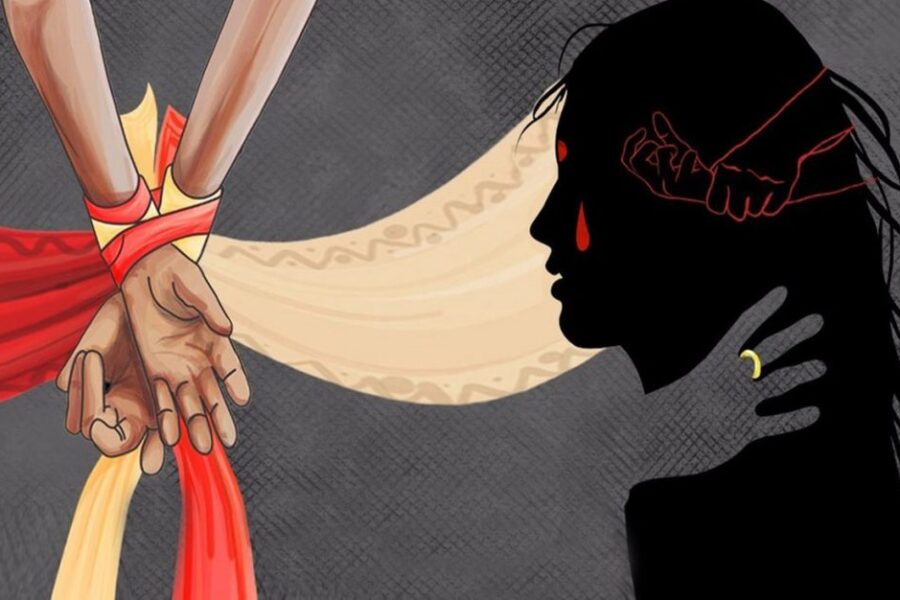Introduction
“Her friends used to tell her it wasn’t rape if the man was your husband. She didn’t say anything, but inside she seethed; she wanted to take a knife to their faces.” – F. H. BATACAN
Rape is an unlawful sex without assent of other person. In India, rape by an outsider is a penal offence under section 375 & 376 of Indian Penal Code, 1860, (Sections 63 & 64 in BNS) but it avoids marital rape from ambit of conviction. Marital rape is sex by spouse with his better half without her assent or by threat.
Today numerous nations have either established marital rape laws, or struck the same out of the exception. This demonstrates marital rape is currently perceived as an infringement of human rights but India still do not recognize marital rape as an offence. The Supreme Court of India and High Court’s are currently flooded with writ petitions challenging the constitutionality of this exception to rape.
This Article critically analyses the non-criminalization of marital rape in India.
WHAT IS MARITAL RAPE?
Currently, under any law, India doesn’t have any provision for marital rape. In general terms, marital rape means when a woman is forced by her husband to engage in sexual relations after marriage, where it is committed against her will & her consent is absent for such intercourse. It can be understood as forceful sexual intercourse by one partner upon the other partner.
CONSTITUTION OF INDIA
A woman’s basic fundamental rights are getting violated due to abuse from her husband. Article 14 & Article 21 of the Constitution of India states that the right to equality and equal protection to every citizen and the right to life & personal liberty respectively. Some men think that the woman they marry is their property, however a female is not anyone’s property because a female is as much entitled to the rights as any other person receives. Females still have to fight for their basic rights which were already given to them years back when the Indian Constitution was in making. Marital rape is a despicable crime & has been criminalized by the law in many countries. It’s high time that the Indian Government should look into it seriously.
ISSUES WITH MARITAL RAPE EXCEPTION
Inconsistent Provision: A husband may be tried for offences such as sexual harassment, molestation, voyeurism, etc in the same manner as any other man but not for rape. A husband separated from his wife may even be tried for rape (Section 376B, IPC). However, the marital rape exception is inconsistent with other sexual offences.
Patriarchal Beliefs: The marital rape exception betrays a patriarchal belief that upon marriage, a wife’s right to personal and sexual autonomy, bodily integrity and human dignity are surrendered.
Destroy the Institution of Marriage: A commonly cited rationale even by the government for preserving the marital rape exception is that recognizing marital rape as a criminal offence would destroy the institution of marriage.
Doctrine of Coverture: Non- Criminalized nature of marital rape emanates from British era. The Marital rape is largely influenced by and derived from this doctrine of merging the woman’s identity with that of her husband. At the time the IPC was drafted in the 1860s, a married woman was not considered an independent legal entity.
WAY FORWARD:
1) NOT AGAINST INSTITUTION OF MARRIAGE: The government defended exception to marital rape in Independent Thought v. Union of India(2017) saying it against the institution of marriage. However, rejecting this claim, the Supreme Court observed, “Marriage is not institutional but personal – nothing can destroy the ‘institution’ of marriage except a statute that makes marriage illegal and punishable.
2) CRIMINALISE THE MARITAL RAPE: In 2013, the UN Committee on Elimination of Discrimination Against Women (CEDAW) recommended that the Indian government should criminalize marital rape.
3) JUSTICE VERMA COMMITTEE REPORT: The JS Verma committee set up in the aftermath of nationwide protests over the December 16,2012 gang rape case had also recommended the criminalization of the marital rape.
CONCLUSION:
Indian law affords husbands and wives as separate and independent legal identities, and much jurisprudence in the modern era is explicitly concerned with the protection of women. Therefore, it is high time that the legislature should take cognizance of this legal infirmity and bring marital rape within the purview of rape laws by eliminating SECTION 375 (EXCEPTION 2) OF IPC which is now, Section 63(Exception 2) of BNS. By removing this law, women will be safer from abusive spouses, can receive the help needed to recover from marital rape and can save themselves from domestic violence and sexual abuse. Let’s wait for the judiciary and legislature to take a step forward to save the dignity of an Indian married woman.
Contributed by:- Adv. Akansha Sharma

